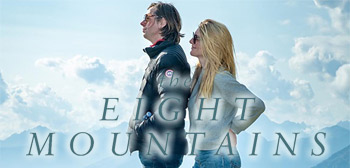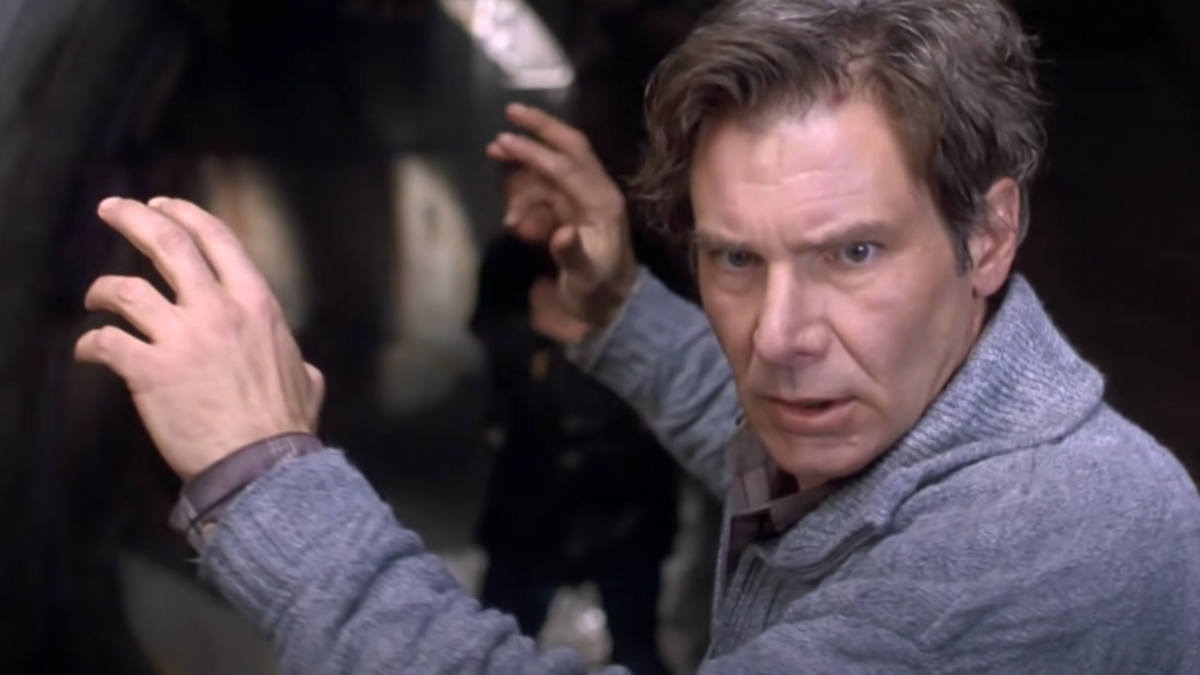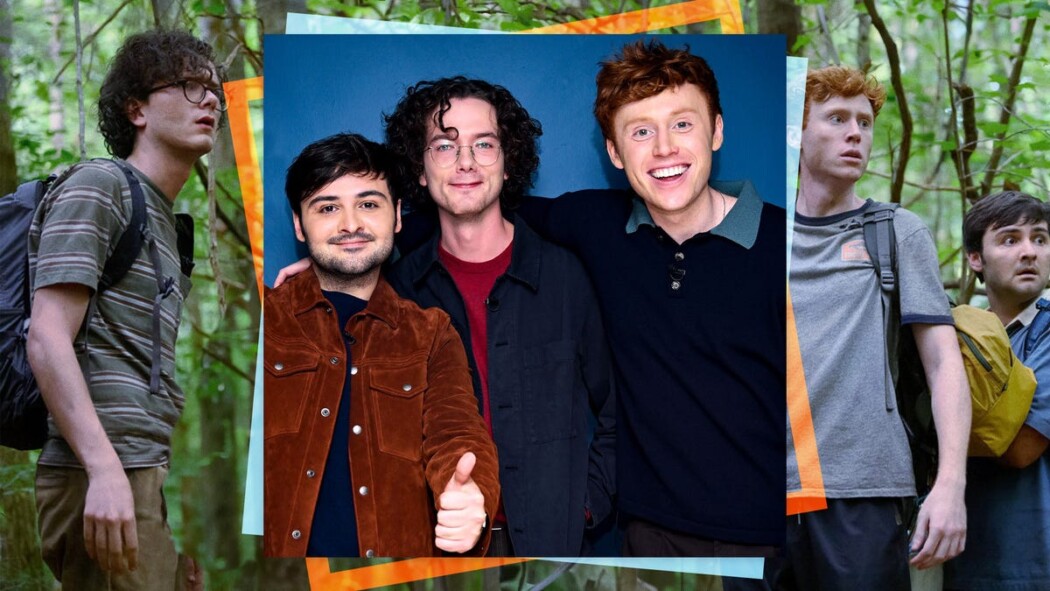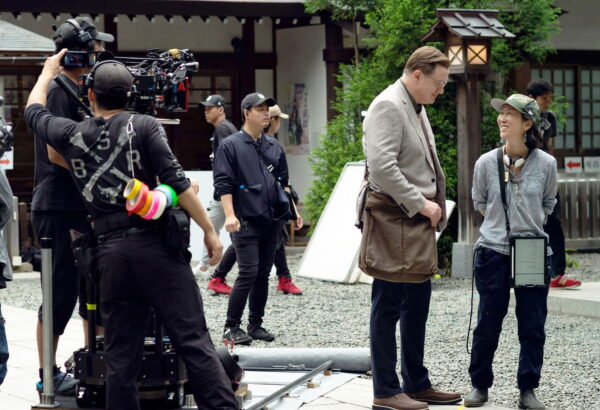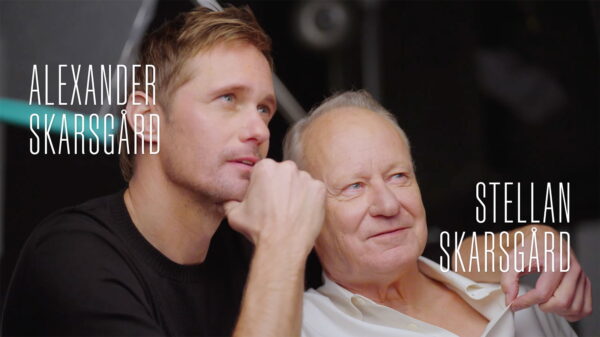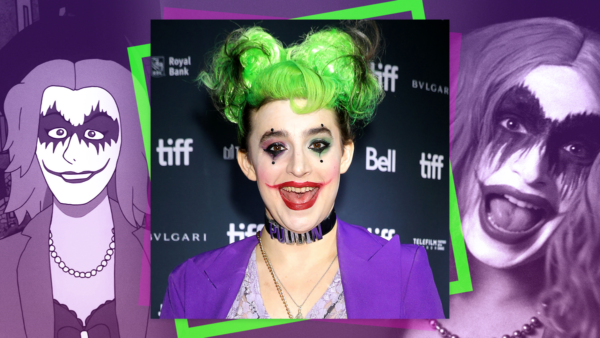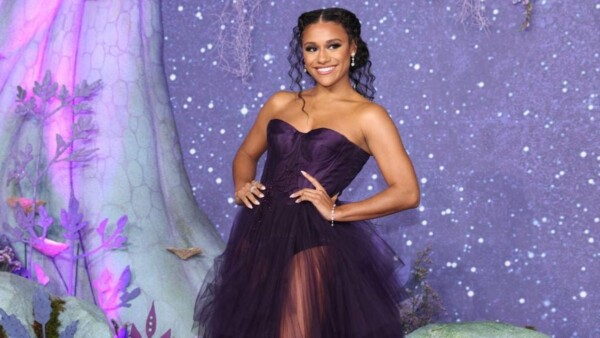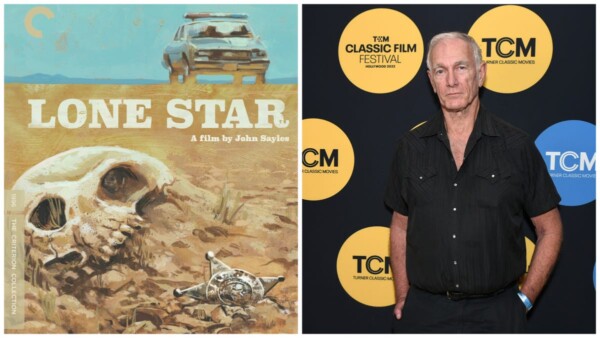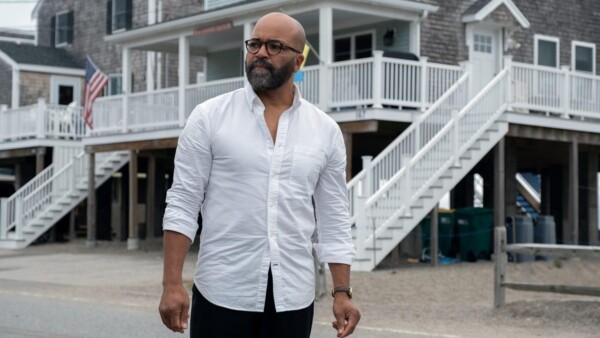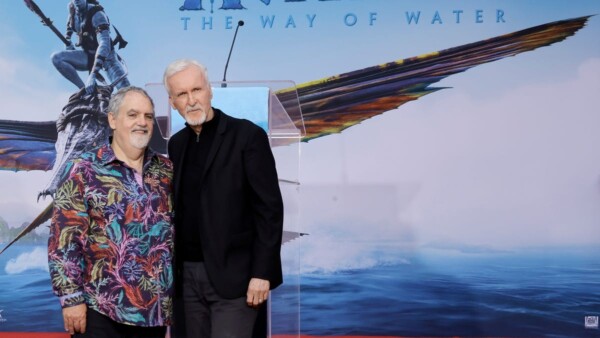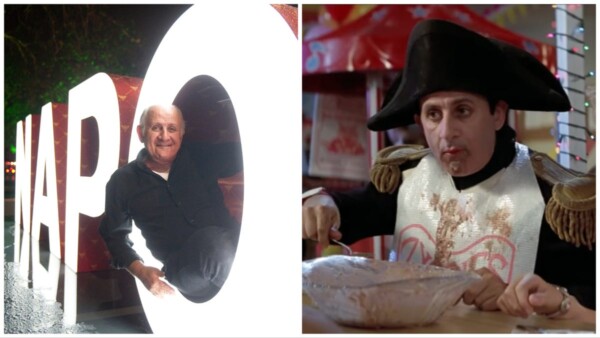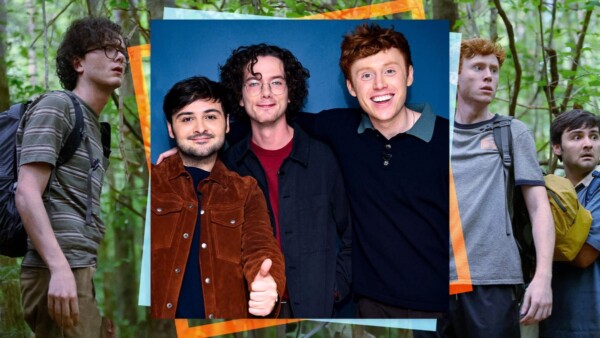Interview: ‘The Eight Mountains’ Directors Felix van Groeningen & Charlotte Vandermeersch
by Alex Billington
August 23, 2023
«Yes, we want to build this house really for real at this altitude. Yes, we really want go on a glacier.» They went to any length to make this film feel real, and authentic, and it’s all the better for it. One of my favorite films of 2022 (and 2023) is called The Eight Mountains, an Italian drama about two friends who grew up in the mountains. I have been raving about it since the 2022 Cannes Film Festival, seeing it again at another festival in late 2022, following its release in spring of 2023. Co-directed by Belgian filmmakers Felix van Groeningen & Charlotte Vandermeersch (who are also married), the film is a remarkable look at how massively powerful mountains are in shaping the lives of humans. I get all emotional just thinking about it, as I’m a huge mountain nerd myself (I even once went to Nepal to trek around the Himalayas, too). I was lucky to get time to interview Felix & Charlotte earlier in 2023 — I’d been chasing them throughout 2022 and earlier this year when they showed up at Sundance to screen the film. No matter when, I’m happy to share this conversation with the two of them — discussing the parts of the film that I think are truly extraordinary.
The Eight Mountains (originally Le Otto Montagne in Italian) is written & directed by Felix van Groeningen & Charlotte Vandermeersch; it’s adapted from the novel of the same name written by Italian author Paolo Cognetti. It stars Luca Marinelli as Pietro, and Alessandro Borghi as Bruno, two boys who become best friends growing up in the Italian Alps near Turin. The film follows them as they grow up and become men, each heading down their own paths: Bruno digs deeper into the mountains, building his own mountain hut from scratch; Pietro explores further, eventually traveling to the Himalayas and meeting a Nepali woman. The film has played at the Cannes, Munich, Melbourne, Zurich, Busan, Zagreb, Cologne, Vilnius, Tallinn, & Sundance Film Festivals, picking up tons of awards along the way. After premiering in art house theaters in the US earlier in 2023, it’s now available to stream on the Criterion Channel. I adore this film, and have written about it many times. Here is my original review from Cannes 2022. I also love the soundtrack by Swedish musician Daniel Norgren — visit his official website. My chat with Felix & Charlotte begins below.
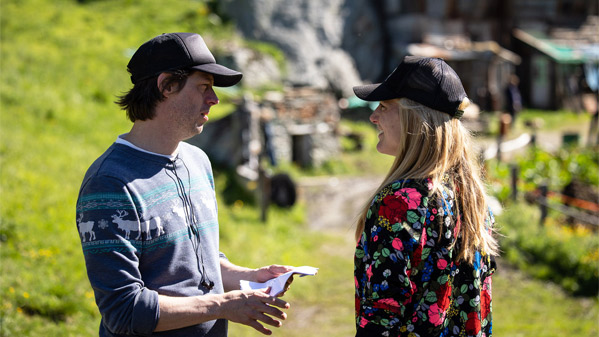
Before making this — how closely connected to mountains were you? What is your relationship with mountains? Did this film bring you deeper into understanding and appreciating them?
Felix van Groeningen: My personal connection is – I’ve been going to this place in the center of France, in between volcanoes…. But not so high. Yet, a very remote place. The closest big shop is 20 kilometers. And the biggest city, it takes an hour to get there, so very remote. And that place, my parents went to live there first… Then they came back to Belgium. It was even before I was born. And we kept going there. My parents built a house there, I have part of my family who started living there. So I have this place that I knew from holidays, that I [also] go to when I need to feel grounded, when the city’s too much. I have my personal Bruno, also, who is my cousin, who still lives there, although they travel more than Bruno did. So I have that connection. This very pure place in the world where time stands still… Where you have very pure lakes and where you encounter yourself with the mountains as a backdrop. And with people from there that we know very well. And my mother had a relationship with a guy from there who was a mason.
Charlotte Vandermeersch: They build their own houses.
Felix: We built our own house. And before I read the book, actually I started to by accident… go into the higher mountains. And I did go to the Alps with a friend for four days to do a hike. And we slept in mountain huts and it was part of my life, somehow. And then I read this book and I’m like, okay, I wanna get to know more. And Charlotte is someone who really seeks adventure. Mountains, maybe not necessarily, but she did go by herself to the Amazon. She did a hike in the Indian Himalayas. She did the Trans-Siberian. So she’s very much an adventurer. In that sense, she also had discovered the mountains, or in being at a very remote place.
Charlotte: I combined for the film this feeling that you get, whether it’s standing in front of an ocean, on a beach all alone at night, for instance. The feeling that you get there. Or when you’re in the Amazon and you travel for days and days. Now it’s faster, because they have fast boats. But before, it was very slow and you get deeper and deeper into the forest and the emotion that brings. Then I went to the Himalayas with my best friends. And you hike for six days in a very remote area, only by foot. And I remember the emotion of it. After a few days, it really got to me. When you feel like a tiny human, but very connected to the whole universe – like you’re tiny, but it’s beautiful. Something like that…
And that I combined with growing up in the countryside. My father especially being friends with all of these old farmers. We would go visit them in these tiny farmhouses. Just seeing the way they lived. Now these people have died and things are really changing now… But this old world of farming, living with your animals, you know? It’s something that I knew from my upbringing.
As a mountain lover myself, I watch so many Hollywood movies that involve mountains and, if it’s not entirely CGI on a soundstage, they just shoot it at a ski resort. And this doesn’t feel authentic, no matter how hard they try… But from the first shot of this film – I’m in. I’m sold. And then there’s 2 + 1/2 more hours of just everything beautiful. This is not something we see often, and I appreciate your commitment. So I’m wondering, how hard was that? How much convincing did you have to do to get everyone on board to film this authentically like that?
Charlotte: I have to say, Felix is a natural. When you go for it, you [really] go into it. And then you drag everybody along. That’s a big part of it.
Felix: Yeah, sure — I have that. I guess as a director, you need to or you don’t get anything made. But we had amazing producers, I have to say, from the beginning.
Charlotte: Also.
Felix: They were all in. Of course at moments, they asked us if we could bring the script down because there were maybe too many shooting days. And other things that came up… But in terms of the vision we had or the vision we developed while we were preparing and developing the movie, because upfront I didn’t [hold back]… The way we were going to shoot it was [figured out] during the development. We said, yes, we want to build this house really for real at this altitude. Yes, we really want go on a glacier. So they went along… And then we realized as we were going along that it was worth it, that it was working and that we had to push it further. We reached a limit, at some moments, where our Italian line producer was like, «that’s not possible.» The actors are never going to sleep in a mountain hut. With the rest of the crew. And we’re like, yes, they will.
Charlotte: They will. And they did.
Felix: And they did. So we just – we kept on saying like, yes, we’re going to do that. But how I don’t know. Let’s figure it out. I guess the stress you take in making that work is that, you don’t know. And there’s nobody who really takes responsibility. Because nobody knows. So you have to bring guides. And the line producer and somebody who… the first assistant [director]. But nobody really knows. So you have to… speak everything through and try it and go to the limit and see what works and what doesn’t work—
Charlotte: Because things are scary at first. They seem a bit threatening with a lot of risks and how and if you get pushed back by that, yeah, you have to be courageous, and believe it’s possible.
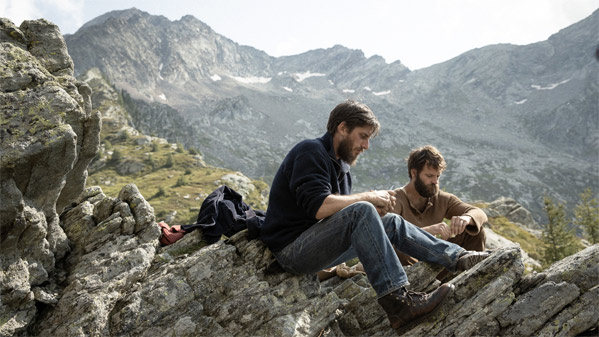
Felix: [Our DP] Ruben Impens and I and Charlotte, I mean… Especially Ruben and I, we go back 20 years. And he’s an incredible force in that, too. To foresee things and to make them happen and…
Charlotte: And be courageous and not make mistakes, and «we’re going to make it work.» And be very flexible. He’s always flexible and going for it. Yeah.
Felix: I’m really happy that you say that that the mountains work so well. I didn’t know if we were going to be able to do that. But you read it [the novel] and you start to write and images start to come and then and you start to get to know the place. And it’s just something that forms itself, I guess.
Charlotte: Well, what’s crazy with you is that… We would take a helicopter – and then it all felt like, wow, it’s going to cost a lot of money, to do some location scouting in this helicopter. Then being in the Alps – «Could we land on that mountaintop? Could you land on this mountaintop?» Maybe it’s just a little bit dangerous. «Oh, we can try?» Things like that. You feel like wow, what are we doing? It’s crazy. But then we would get back down and we assess what we’ve seen and what we’ve learned and then Felix would say, okay, so what we’ve learned—okay, yeah, this is more interesting, this and that. Well, let’s go there again. And they’re like, «again?» Yeah. We need to go again. And I’m like, really? «Yeah.» Then a third time. «Yeah.»
And I’d be like, wow, this process of making this film and getting to know a place – it’s really a big effort. It’s going there again. Sometimes I was like, what? What should I be seeing now that I haven’t seen before… Not knowing the process. All right, now I can see how things evolved every time more pictures, more, more, more, yeah – it’s this whole evolution.
Felix: And I think the mountain really works because it’s also it really found its place in the script, right? In the storytelling. In function of… how the story moves and what it means for the characters or how a character becomes part of this place, that you get to know more or less in the visual geography of the movie.
Charlotte: And how important it was to defend, for instance, the walk up. [The characters] first walking up [the mountain in the film]. Then with the mules… The effort it takes. And we needed shots along the way. These are things that when you look at it and they are walking up, the producer’s saying, «why don’t you just cut those moments in between?» They start walking and then they get there. Well, it’s a big thing defending this because you need to feel the effort and to feel how far things are. And with the motorcycle, it’s a long ride on the motorcycle. And then they need to walk more… It’s like a long walk. So this is—this was a job. And realizing how important this was. You can’t just jump and be there.
Yep, that’s exactly why I’m asking about this. I’ve done one of the big treks in Nepal, too. And I learned about how much effort and energy it takes. That’s something that comes through in your film that I don’t think I’ve ever seen in any other mountain film. In documentaries, yes, but in a feature, that’s very rare to see. This is why it moved me so deeply. How much – how dedicated you were to bringing all of these lived-in, accurate experiences of the mountains to the screen and not cutting them out and not shortchanging it wherever you go…
Felix: The book set the basis of that, too. The book makes you realize more of what the mountains are. And makes you look differently at the mountains. So arriving there, having read the book, experiencing it ourselves, it became—our experience became part of the movie. That’s why we also when we went to Nepal, we said, we’re really going to do the trek. So we did it for real.
Good.
Charlotte: Yeah. Because if not, the alternative was taking jeeps and going along the paths that have been walked – the big touristic Annapurna trek. But how are we going to film him getting to a very authentic place along there? Then we would’ve had to stage that. Because we didn’t have the time to prepare also. It was during COVID-19 times, the country’s locked up, so the moment it opened up, we just went there and had a month to film…
Oh, wow.
Charlotte: And yeah, we shot a lot of great material. It was a very stressful month, but we did a lot. And we all lost like eight pounds or ten pounds. Because it was so physical.
I also want to compliment the pacing of the film, and discuss how exquisitely paced it is. At first, I thought the whole film was going to be about these two kids. Then you move on as they grow up, then they go out and experience life… After all of this time, I still I wanted to keep following their story. I wanted to keep finding out where they’re going to end up and what’s going to happen next. My first thought is — how much more footage do you have of the two kids? Could you have made a whole movie with just them?
Felix: Well, actually we cut the most from the kids. We did have more.
It felt like it… I could’ve spent the whole time watching their story.
Charlotte: We loved the kids’ section.
Felix: [There’s] another whole film. But…
Charlotte: It was really hard to cut there. That was really a pressure point that we had from up above.
Felix: Yes. Yes. For us it was – what do I want to say? We were confused at some point in the edit. When we first showed the film to people, we thought adults… the second and third part, let’s say the building of the house and everything else, was too slow. It was really taking too much time. But in the first cut, we realized all those scenes, they’re working. They’re working. Let’s give it time. Let’s give it time. But it did feel that the film was somehow out of balance. And we thought – we have to go faster there. And then reactions from people involved and not involved were rather the opposite – the beginning is harder to get into and then the rest is really working. Then it was about finding that balance. And indeed pressure from above to get the movie under 2 + 1/2 hours. And to cut the beginning. And then there were moments where we tried that, where we were like, okay, it works. It’s better. Everything’s there… it’s usable, well told, and it works. And then at moments, we did try and went further and were like, but this… no, we don’t want to go there. We have defended it! To give the kids time all through the process, in the writing, every [step of the way]—
Charlotte: Always we needed to defend that. «Why don’t we just start off when they’re already friends?» No. We we want them to feel their loneliness. It’s brief, but you feel why. It’s also something intuitive. But they have to get to know each other. And you see how different they are, there’s something energetic about their coming together. These were things that were… under attack often.
Felix: But somehow the first cuts of the scenes when they were adults… In pacing, a lot changed throughout the whole edit – as it goes. But on the other hand, it very naturally found the right pacing and it was close to what we felt on set.
Charlotte: It was close to what happened on set. It was very natural in that way. Didn’t need to manipulate.
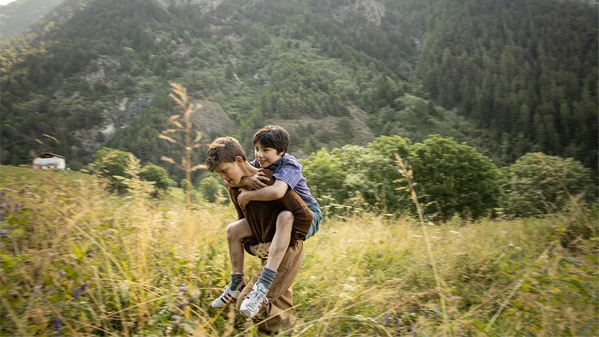
You mean – you could get a sense for the entire story while you are on set as to what you are building and getting from these performances, right while it’s happening?
Charlotte: They had very natural pacing between the actors… When you ask them about it, I heard them answer, it was already in the script. Every pause, every—we gave a lot of silence and a lot of «air», let’s say, space in between reactions to each other. It was not written «they’re reacting all the time.» Give it time. Breathe. Think. Take it in. Give it back. And then they just naturally delivered this dialogue and we did not need to manipulate that a lot in the edit. It just worked the way it was. That was… pretty cool.
Did you test screen the film with a public audience? Or only a family and friends preview?
Felix: Family and friends.
I’m curious: do you trust a public audience to actually give you proper feedback? Or would you rather prefer to trust yourselves as filmmakers and storytellers more?
Felix: Depends on the mood I’m in. I like to show it to people. Beause as you watch together with people, you watch through their eyes also. Sometimes it’s not so much the discussion afterwards that is interesting, but your experience as you’re watching it with them.
You speak so confidently about your editing here that I’m thinking, okay, you’ve clearly not only borrowed from some of the reactions of these people, but also made sure to stay true to what you believe in, in terms of telling the story properly.
Charlotte: Sure. We did – we showed it to people, this and that, but it’s always just us looking at each other after the screening, sharing our feelings about it. And if something comes back from one of your friends, or a person that was there, you feel confident, because yeah, I understand that. It’s a reflection of your own idea.
Felix: Yeah. The interaction with the producers was really important and beautiful at times. Other moments it was harder, but in general – and especially the first times they watched – it was incredibly productive, I would say.
Charlotte: They’ve always been very supportive. First of all, they’re nice people. They are very supportive. They know that’s what will help. The producers gave us confidence… Let us just find out where we are.
Felix: But it’s a process. In the beginning, you want try different things – with voiceover, too. You’re still figuring out what it has to be. And every step of the way… you want to stay open. Your feeling has to be right… You have to stay true to a certain feeling, but on the other hand, you have to keep experimenting – I think, that’s what makes it exciting.
Charlotte: I thought it was a interesting journey… You write and you rewrite and then you prepare and then you shoot and then things get mixed up again and so for the 50th time, you assess this scene and in the end you don’t really know anymore what you are conveying. So how much info do you need to put in? How much can you just leave out? And it’s already there. That’s where the editor is super important. Nico Leunen is a great editor. He really feels what it needs, what it doesn’t need. How you can keep some mystery, he really understands that. What you need, what you don’t need. That’s an interesting journey, I think. That’s what editing is all about. Because you stuff it with so much detail… And then you find out.
I also must ask about the choice to use Daniel Norgren for the soundtrack. I want to know about the story of how you found him and how you ended up thinking that he’s the right person for this? I think he’s perfect, I love his songs in this film, it’s a magical match. Why did you choose him to score this film?
Felix: We had gotten to know an album by him called «Alabursy«, which, a couple of tracks or most of the tracks from that album ended up in the movie.
Charlotte: This is really the inspirational album.
Felix: Yeah. Charlotte got it from her brother. And so that’s how we got to know him. I started listening to a lot while I was writing and working on the project. And I brought it up at some point with Charlotte and with Nico. And they were both very excited. We decided yeah, let’s just go for it. We reached out before—a long time before shooting. Six months before shooting. And he was very much interested. He read the script. Loved it. He wanted to do it. And then… something went off. It just became strange and he backed out. He said that he didn’t have time. That he wanted to focus on other things.
Charlotte: He’s just 250%. He suddenly realized that this would dominate his own life and work and then that he would not be completely free also, because it’s a film. You have a big production company behind it. You know? And he backed out.
Felix: It was strange, beause we had great contact and all of a sudden, he was gone. And we were really mourning. We were like, oh fuck, we really don’t know what we’re going to do…
So I started to try and find other options. And actually Charlotte is the one who was always like, no, no, no, no. And I was ready to move on… We have to find somebody else. And she kept on saying, it’s not better, it’s not better. And we tried all different kinds of music… We weren’t trying to copy his style with a different artist, that wasn’t going to make sense. We were parting in a different way. Until – as we were already shooting the movie, in between blocks, we hear a song of his on the radio and we’re both really moved and we realize it’s him and I say to Charlotte, we’re just going to ask him if we can use his songs. And that could be a solution. And we did and he immediately said yes. And that’s how we started the conversation again. Because he was still super excited by the project. And he was like, «oh, like that way? That’s fine.» And what we hoped would happen, did happen, is that at some point he’d like it. He started to send stuff that he hadn’t released yet and it became part of the movie. In the end, although he didn’t do a lot for it, it became a very creative collaboration with him.
Charlotte: Nothing was composed for the film.
Ohhh, wow, okay…
Charlotte: But he composed a lot of soundscapes, just by himself. And he had this in his drawer. And some [sounds] found their way into an album as an intro or an outro. He often uses that. But then he just told us, oh I have this left, or I have this. And then he told us – this is the film I was making music for without having a film. So that was great. That was just beautiful.
Yeah, it worked out beautifully.
Felix: It was meant to be, somehow, and it worked out after a long trajectory.
Charlotte: Yeah, he came too, for opening night. It was great.
Thank you to Felix & Charlotte for their time and also to Cinetic for arranging this interview.
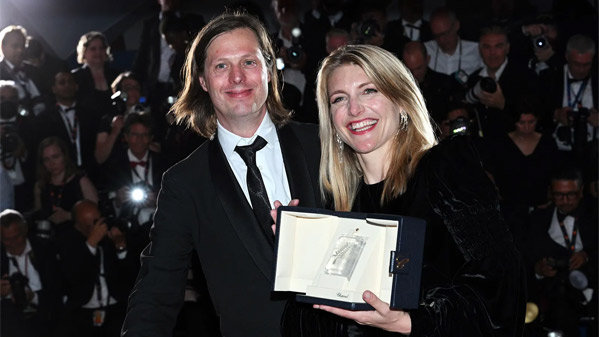
Felix & Charlotte’s The Eight Mountains won the Jury Prize award at the 2022 Cannes Film Festival last year. The film initially opened in US theaters starting April 28th, 2023 earlier this year. It’s also available to watch streaming on Criterion Channel right now. Listed as one of Alex’s Top 10 Films of 2022 (screened at multiple festivals). Worth a watch anytime – enjoy the exhilarating experience of this cinematic journey.
Текст выше является машинным переводом. Источник: https://www.firstshowing.net/2023/interview-the-eight-mountains-directors-felix-charlotte/



